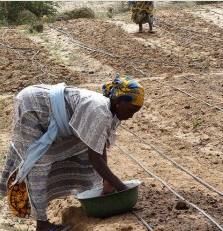 Rising food prices represent a major threat to food security in developing countries. Hardest-hit are the poor, who often have to spend up to 70 percent of their income on food. According to the World Bank , in 2010-2011 rising food costs pushed nearly 44 million people into extreme poverty and recent price hikes could lead to an additional 30 million more.
Rising food prices represent a major threat to food security in developing countries. Hardest-hit are the poor, who often have to spend up to 70 percent of their income on food. According to the World Bank , in 2010-2011 rising food costs pushed nearly 44 million people into extreme poverty and recent price hikes could lead to an additional 30 million more.
There are many causes to the latest spike in the cost of food, according to the World Bank’s Food Price Watch including changing weather patterns, the increase in the demand from emerging economies, and the growing production of agrofuels.
The food crisis is also intimately linked to the current economic crisis—food and agriculture have become heavily dependent on oil. With the markets in flux and ongoing conflicts in regions where petroleum is widely produced, oil has steadily increased in price. The rise in the price of oil has had a direct impact on the rise in the cost of basic foods. According to The World Bank, when the price of oil is over fifty dollars a barrel, a 1 percent price increase in oil causes a 0.9 percent increase in the price of corn.
With poor families in developing countries spending large percentage of their incomes on food, the smallest rise in food prices can be a huge burden to bear. The food price index, the measure of the monthly change in international prices of a basket of food commodities, showed a small dip of 1 percent in September, but it is still 19 percent above its September 2010 levels.
The United Nations Food and Agriculture Organization (FAO) has released a guide for policy-makers which stresses that a mix of policy and programmatic actions are necessary to stabilize food prices and establish trust between private sector traders and governments. Policies that provide investment in developing countries and improve seed varieties at the community level have proven to be effective. In order to stabilize food prices programs need to be adapted to local conditions and agreed upon by key stakeholders in each country.
Have you heard of any organizations efforts trying to stabilize food prices?
By Bryan Dorval. Photo Credit: Bernard Pollack

Danielle Nierenberg, an expert on livestock and sustainability, currently serves as Project Director of State of World 2011 for the Worldwatch Institute, a Washington, DC-based environmental think tank. Her knowledge of factory farming and its global spread and sustainable agriculture has been cited widely in the New York Times Magazine, the International Herald Tribune, the Washington Post, and
other publications.
Danielle worked for two years as a Peace Corps volunteer in the Dominican Republic. She is currently traveling across Africa looking at innovations that are working to alleviate hunger and poverty and blogging everyday at Worldwatch Institute’s Nourishing the Planet. She has a regular column with the Mail & Guardian, the Kansas City Star, and the Huffington Post and her writing was been featured in newspapers across Africa including the Cape Town Argus, the Zambia Daily Mail, Coast Week (Kenya), and other African publications. She holds an M.S. in agriculture, food, and environment from Tufts University and a B.A. in environmental policy from Monmouth College.








